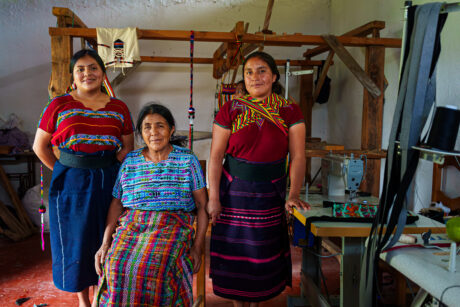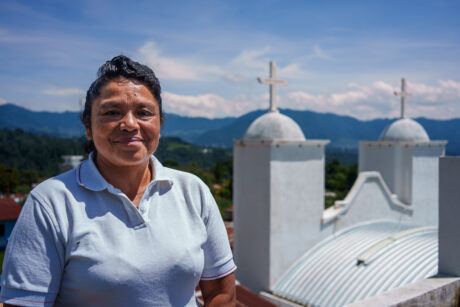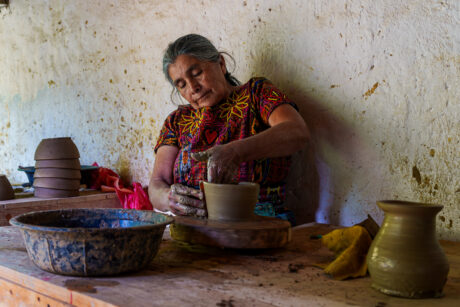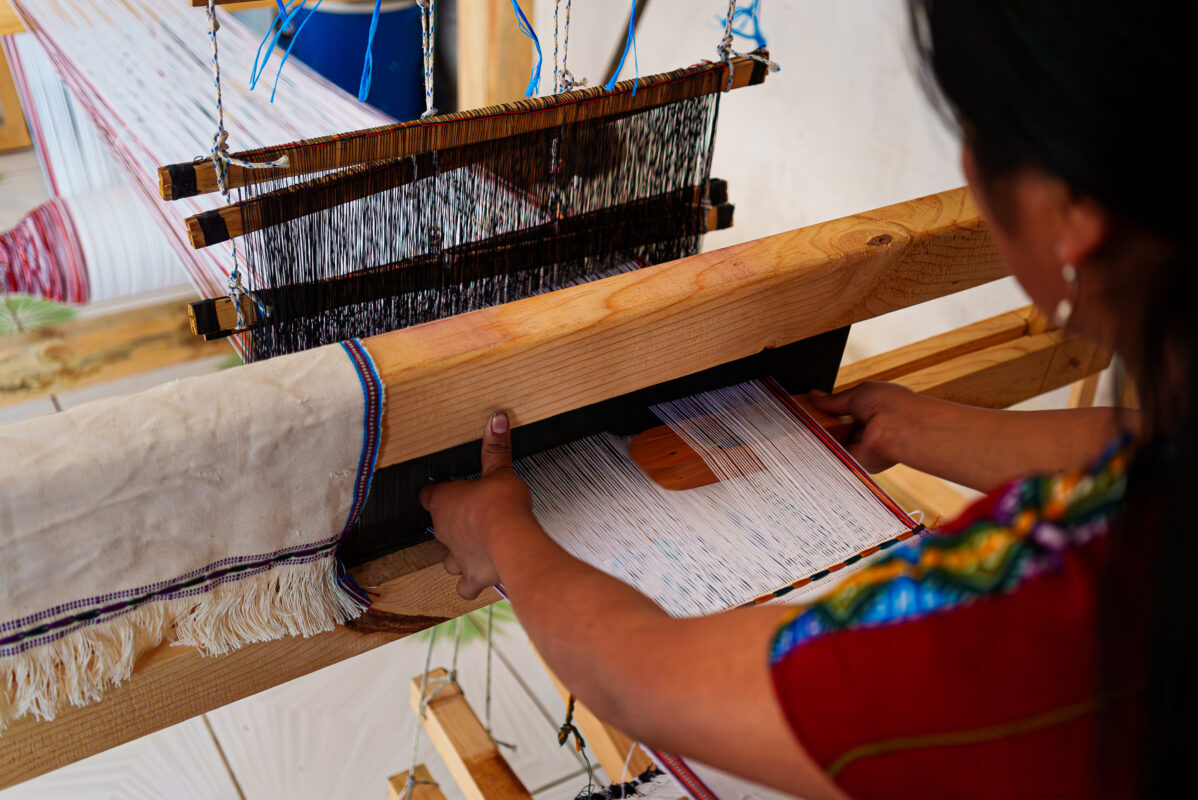Participants’ names and some details have been changed to protect the identity of the survivors who shared their stories. Totonicapan, Guatemala“I didn’t see a way out of this situation, except to just put up with it,” shares Mercedes, a survivor of violence against women and girls, indigenous woman and single mother from the Western Highlands.
Deciding to leave a violent relationship is challenging for victims of violence against women and girls. Survivors may lack resources or a support network, worry about social isolation, fear for their lives, have been conditioned to think this is normal, or not know that they are in an abusive relationship. “My children and I have suffered so much. Malheureusement, I had a blindfold on my eyes but as soon as it came off, I said no. No more. No more violence,” says Mercedes.
All survivors of violence against women and girls deserve the right to care, support and healing but accessing these services in Guatemala is not always easy.
"Parfois, there are women who don’t look for help. They say ‘no, I’m too scared’ or ‘I’m being threatened’ and they stay in that relationship,” says Mercedes, who shares that she stayed in her relationship for too long and did not have family support when she discussed leaving her partner.
Psychological and legal services are few and far between in the Western Highlands, surtout dans les zones rurales. Plusieurs fois, these organizations lack the resources to address the growing demand for their services. Qui plus est, indigenous survivors hesitate to use these services — which are provided in Spanish — due to language barriers, lack of cultural relevancy, or social beliefs that result in victim blaming.
The Office for the Protection of Indigenous Women — abbreviated as DEMI in Spanish — saw an opportunity to offer culturally relevant care to indigenous survivors. Juana Tax, a departmental delegate for the DEMI in Totonicapán, joined forces with le Peacebuilding Project to incorporate the Mayan worldview into the healing process for survivors of violence against women and girls, providing ancestral practices and psychosocial services to participants.
Le Projet de consolidation de la paix, Tisser la paix en espagnol, est un projet de 6,5 ans financé par le NOUS. Agence pour le développement international (USAID) réduire les conflits sociaux et la violence et renforcer la cohésion sociale dans les hauts plateaux occidentaux du Guatemala. Mis en œuvre par Associés créatifs internationaux avec PartenairesGlobal et ProPaz, Le projet de construction de la paix atteint 130 communautés dans 15 municipalités.
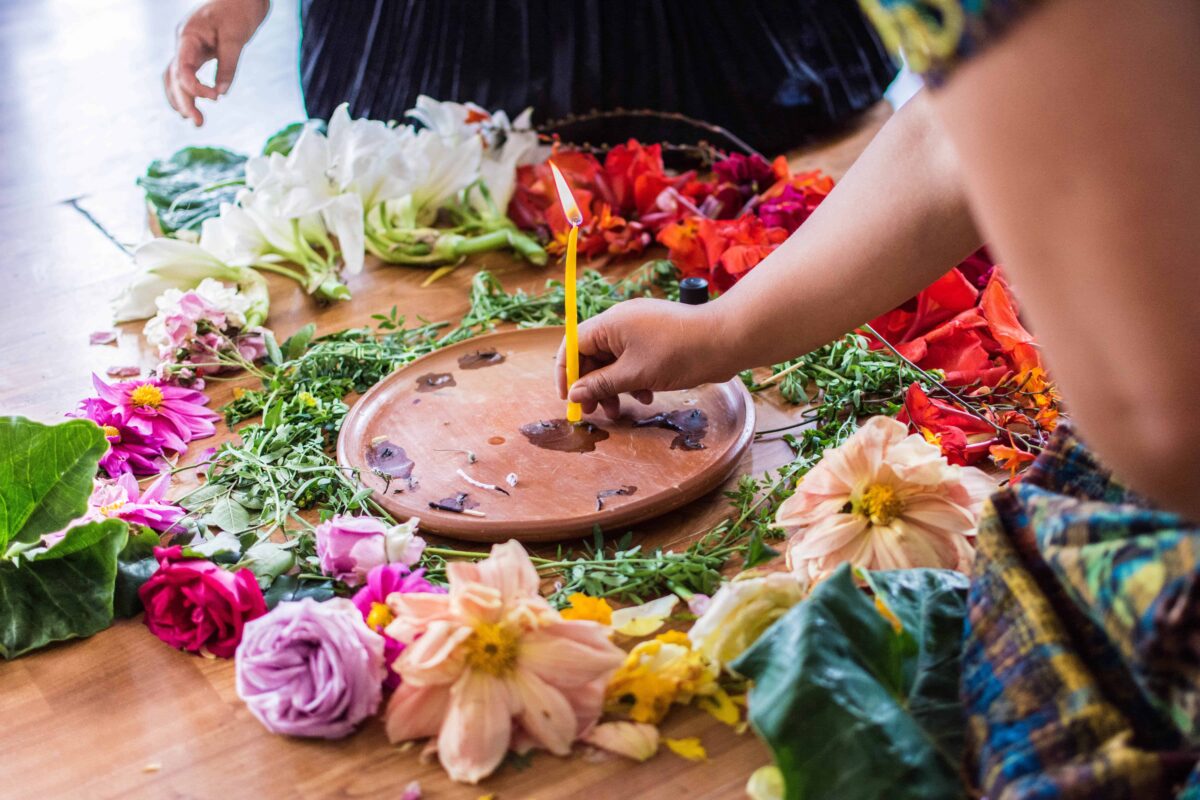
Facilitators began each session by lighting candles and holding a brief traditional Mayan ceremony to honor the day’s Nahual — the energy, spirit or strength that brings to life and guides a person — which is a sacred moment for indigenous Maya people. Then participants learned ancestral practices and healing techniques, finding balance through meditation and acknowledging their emotions. Participants also learned about their rights and began to identify the cycle of violence through an analysis of their family tree.
Many found solace in sharing space with other survivors to support and learn from one another’s experiences. “I really liked it when in one of the first sessions we got to interact with another participant,” says Gabriela, another survivor of violence against women and girls who attended the sessions. “That was really nice because we learned each other’s stories and began to build a relationship.”
After the sessions finished, DEMI conducted interviews with the participants and found overwhelming interest in additional trainings focused on overcoming guilt, managing anger, and allowing self-forgiveness. DEMI and the Peacebuilding Project responded with a five-session training, which incorporated themes of empowerment and aimed to build confidence, develop leadership skills, and provide tools for anger management and forgiveness.
“One of the topics I really was drawn to was forgiveness,” shares Mercedes. “I used to go out and see people that have done me wrong and feel hate when I looked at them. Since the healing sessions I’ve begun to forgive them so now when I see them in the street, I say, ‘good morning, good afternoon’ and they look at me like I’m crazy, but I feel so much better.”
“My own healing helped my family”
The benefits of the healing sessions are not limited to just the women survivors who participated, they are also impacting entire families.
Sandra was going to leave her husband because of their inability to communicate, which was exacerbated by anger control issues and unwanted intervention by other family members. Sandra spoke with Tax at the DEMI who convinced her to participate in the trainings before making any decisions. “Thankfully, we are still together and are improving the relationship with each other and my in-laws,” says Sandra.

"Avant, I felt like my husband talked down to me, but his attitude has improved a lot. And my communication with my mother-in-law is better now," dit-elle.
The sessions had a positive impact on Mercedes’s family as well. “I kept going to the healing sessions and when I would go home, J'étais si heureux, and I would tell my children what I had learned. It helped us to have a better relationship,” says Mercedes.
“My daughter was very shy and didn’t talk in school. Her teacher would tell me that my daughter wouldn’t do her homework and she needed help. I decided to help myself first and then I would help my kids," dit-elle. “With my own healing, my daughter changed. She does her homework and talks to the teacher. Her teacher asked me ‘what did you do to help your daughter?’ And I said ‘nothing, I’m just receiving these trainings and come home and tell my kids about them.’”
Mercedes smiles when she says, “The teacher congratulated me and told me to keep doing what I’m doing… this has helped me a lot personally.”
The bright look on her face and lightness in her voice spoke volumes. “I liked it when they taught us to say ‘I am me. I’m unique. I value myself. I love myself. I accept myself for who I am.’”
This has a domino effect in the communities.
“Some of these women are replicating their learnings with their neighbors and have developed the capacity to support and guide other women that are in similar situations,” explains Daniela Galindez Arias, Gender and Social Inclusion Advisor for the Peacebuilding Project.
"It is precisely through strategies of cohesion and shared learning that the Peacebuilding Project contributes to the transformation of conflict in the Western Highlands of Guatemala," dit-elle.
Responding to an increased need for services and prioritizing prevention
While culturally relevant healing combined with legal and psychosocial support is important for violence against women and girls survivors, prevention is even more critical.
UN woman is violently murdered every 12 hours au Guatemala. Selon le USAID/Guatemala Gender Analysis, Le Guatemala présente l'un des niveaux de violence les plus élevés d'Amérique latine et des Caraïbes.. These statistics are not just numbers to the Guatemalan women, hommes, jeunesse, dirigeants communautaires, and ancestral authorities who see this violence playing out in their communities.
While many Guatemalans know that violence is negatively affecting their mothers, sœurs, daughters, neighbors, friends and the overall social fabric of their communities, a major challenge is that intrafamilial and violence against women and girls has been normalized and is often seen as a private issue not to be publicly addressed, contributing to the perpetuation of the problem.
Heureusement, through participatory, community-led processes that include dialogue and reflection, more than a 100 of the Peacebuilding Project’s current target communities have identified violence against women and girls as an obstacle to effective community development and have prioritized preventing and responding to violence against women and girls as a peacebuilding strategy.
“Violence is a multicausal social problem with complex consequences for girls, jeunesse, et les femmes. The approach should be multidisciplinary and interinstitutional,” explains Galindez.
The Peacebuilding Project and USAID have taken a multifaceted approach to preventing violence against women and girls. They have held intrafamilial violence awareness campaigns, built capacity among ancestral authorities— like midwives — on how to report cases of violence, and trained women who experience economic violence on income-generating crafts, among other initiatives at the community, municipal, départemental, and national levels.
